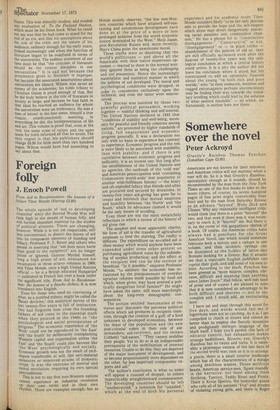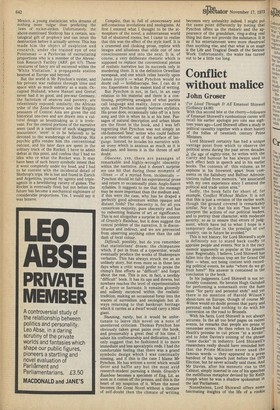Scimewhere over the novel
Peter Ackroyd
Gravity's Rainbow Thomas Pynchon (Jonathan Cape £3.95) Americans are not known for their reticence, and American critics will not murmur when a roar will do. So it is that Gravity's Rainbow, apocalyptic enough as it sounds, should be recommended by the man from the New York Times as one of the five books to take to the moon (there, of course, its seven hundred pages of fine print might conceivably float free) and by the man from Saturday Review as an advance "beyond" Agoby Dick and Ulysses. Why any reasonably intelligent critic would think that there is a point "beyond" the two, and that even if there was it was necessary to reach it, is "beyond" me. But there it is, on the cover of this gargantuan obelisk of a book. Of course, the American critics have always had a penchant for the Great American Novel, one which would somehow fabricate both a history and a culture in one volume, and their eccentric ravings can be dismissed as the foibles of latter-day Romans looking for a Greece. But it amazes me that a reputable English publisher can reprint their gush, and add some of his own to boot. According to the blurb, Pynchon has been greeted as "more bizarre, complex, obscene, difficult and stunning than anything since James Joyce." Hail fellow, well met kind of prose and of course I am pleased to note that it is now considered an advantage to be both difficult and obscene — not to say complex and, I would add, an excruciating bore.
I have sat and slept through this novel for five days, and words would fail me if .logorrhoea were not so catching. As it is, I am compelled to clutch at straws and cannot do better than to employ the fiercely inventive and prodigiously intricate language of the blurb itself. I hope you'll pardon this lack of editorial control, but exhaustion makes strange bedfellows. Bizarre, yes, Gravity's Rainbow has its twists and turns. It is ostensibly a picaresque version of the last days of the second World war; rash as it is to attempt a precis, there is a small interior landscape which has all the characteristics of a mirage among deathless wastes. Those mythical beasts, American service-men, figure roundly in the narrative: not least among them Slothrop, Tantivy, Teddy Bloat and Pirate. There is Kevin Spectro, the homicidal quack who calls all of his patients "Fox" and dreams of violating young girls, and there is Roger
• Mexico, a young statistician who dreams of nothing more vulgar than predicting the laws of rocket-strikes. Unfortunately, the above-mentioned Slothrop has a certain, scatalogical gift of prophecy and can intuit the destruction before it actually arrives. This has made him the object of suspicion and research, under the trained eye of one Pointsman — a Pavlovian of excruciating proportions who is a member of the Abreaction Research Facility (ARF, get it?). These creatures of fancy are all esconced within the 'White Visitation,' a propaganda station beamed at Europe and beyond.
But the world is Mr Pynchon's oyster, and his private war radiates through time and space with as much subtlety as a stain. Occupied Holland, where Hansel and Gretel never had it so good, and pre-war Germany, the factotum of seances and poverty, are relentlessly exposed; similarly, the African tribe of the Zone-Hereros and the Kirghiz peasants of Central Asia are given the old historical one-two and are drawn into a cultural design as breathtaking as it is irrelevant. For the central portions of the narrative seem (and in a narrative of such staggering insouciance, 'seem' is to be believed) to be devoted to the wanderings of Slothrop. His psychic gifts render him the conventional outcast, and his later days are spent in the solitary track of the Rocket. I have to admit defeat at this point, and confess that I had no idea who or what the Rocket was. It may have been of such heavy symbolic intent that it went completely under my head, and I had to be content with the incidental detail of Slothrop's trips. He is lost and found in Zurich and Argentina, pursued by agents and tripleagents in a bewildering variety of guises. The Rocket is eventually fired, but not before the future has become a mechanical nightmare of considerable proportions. Yes, I would say it was bizarre.
Complex, that is, full of unnecessary and self-conscious involutions and neologisms. At first I entered what I thought to be the atmosphere of the novel, a subterranean world full of shuttered rooms, but I came to realise that this was the effect of the style itself. It is a crammed and choking prose, replete with images and allusions that slide out of one consciousness and into the next. It is, of course, a very deliberate rhetoric which is supposed to replace the conventional pieties of realistic narrative but its succeeds only in murdering them. It is the definitive Orwellian newspeak, and one which relies heavily upon James Joyce's — what Pynchon would no doubt call — kollidoscrape. See, I can do it too. Experiment is the easiest kind of writing.
But Pynchon is not, in fact, in an easy relation to his material and there is a continuing, perplexing amalgam of what purists call language and reality. Joyce created a style, and Pynchon merely borrows stylistics. His prose does, occasionally take off in a lyric song and this is when he is at his best. Passages of natural description and urban blues are the finest in the book, and I was left regretting that Pynchon was not simply an old-fashioned 'beat' writer who could fashion a private rhetoric out of the surface of language. Instead, he invades his narrative with an irony which is anxious as much as it is dead-pan, and leaves it in the throes of self doubt.
Obscene, yes, there are passages of remarkable and highly-wrought obscenity within the narrative. And it doesn't surprise me one bit that during these mom,ents of climax — of a myriad form, incidentally — Pynchon should let fall his experimental prose and return to occasionally plain Anglo-Saxon syllables. It suggests to me that the message may be more important than the medium and, If this were the case, why has he draped a perfectly good adventure within opaque and distant folds? The obscenity is, for all you censorious. majority, pure obscenity and has no redeeming features of art or significance. This is not altogether a surprise in the context of Gravity's Rainbow, but it does suggest the central problem of the narrative. It is discontinuous and indirect, and we are prevented from observing anything other than the odd dash of local colour.
Difficult, possibly, but do you remember that statisticians' dream: the chimpanzee which, if put in front of a typewriter, would eventually produce the works of Shakespeare verbatim. This has always struck me as an unlikely story, but even more so in these late days when a critic would prefer to praise the chimp's first efforts as "difficult" and forget about the rest. This is not, in fact, a terribly "difficult" book. It has its ups and downs, but nowhere reaches the level of experimentation of a Joyce or Sarraute. It remains gloomily and sullenly esconced within the realistic tradition, making an occasional foray into the wastes of surrealism and neologism but always returning to that bankrupt heritage which it carries as a dwarf would carry a blind giant. Stunning, rarely, but it would be unfortunate to leave this novel on a note of unrelieved criticism. Thomas Pynchon has obviously taken great pains over the book, and presumably a great deal of his time. I salute his craftsmanship and dedication, and I only suggest that he fashioned it to more immediate and less apocalyptic ends. I had the comfortable feeling that there was a grand symbolic design which I was continually missing, and if this is the case I blame Mr Pynchon. He has written a novel which would deter and baffle any but the most avid research-student pursuing a thesis. Gravity's Rainbow becomes a specimen of Eng. Lit. as soon as it comes off the presses, and this is the heart of my suspicion of it. When the novel becomes the Great Novel without a tincture of self-doubt then the climate of writing becomes very unhealthy indeed. I might put the same point differently by noting that Pynchon offers us the rhetoric and the appearance of the grandslam, ring-a-ding real thing but does not provide the substance. It is as if his entertainment were more theatrical than anything else, and that what is on stage is the Life and Tragical Death of the Serious Work. Unfortunately, the wake has turned out to be a little too long.



































 Previous page
Previous page